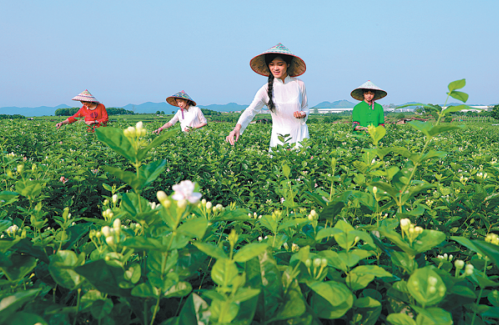Primed for new growth


Chinese jasmine tea hubs set to take center stage at home and abroad
Editor's note: Implementation of the China-EU Geographical Indications Agreement is expected to expand the reach of quality products from both sides. This series looks at goods poised to tap into East-West markets.
Liang Jinying brushed her hands over the rows of waist-high shrubs, deftly plucking soft white buds from the tops of plants under the blazing midday sun.
"They have to be growing at the exact size-not too small and hard, nor opened and in bloom. I can feel them, just nice, between my fingers. It's about being at the right place and time," said Liang, 60, a jasmine bud picker in Hengxian county, the Guangxi Zhuang autonomous region.
The county, which boasts a warm climate, ideal business networks and investment support, produces more than half of the jasmine flowers consumed worldwide. The jasmine is mostly used to scent Chinese teas, which are processed near planting sites because the flowers must be freshly pressed and infused into dried tea leaves, prompting many in the industry to laud Hengxian as the "jasmine tea capital of the world".
Pillar industry
Hengxian accounts for more than 80 percent of the country's total jasmine production, according to industry figures. Jasmine cultivation covers about 8,000 hectares in Hengxian, with about 330,000 residents involved in flower planting and farming. The pillar industry helps the county reap about 12.5 billion yuan ($1.93 billion) in comprehensive annual output value.
Lu Hongjian, director of the agriculture bureau of Hengxian county, Nanning, Guangxi's capital, said that at least 10 million yuan is directed toward development of the crucial sector every year, with more than 500 million yuan invested in recent years in a jasmine industry park, including a planting demonstration base covering 333 hectares.
"Jasmine tea is the quintessential Chinese beverage," Lu said. "It is not just enjoyed wherever there are Chinese people; its fragrance also marks the tables of Chinese cuisine enjoyed by those in the West and others abroad."
Nearly 200 metric tons of tea were exported via Nanning in the first half, including more than 23 tons of jasmine tea, mainly to markets such as Japan, the United States, Vietnam and France, with related exports recording a year-on-year rise of nearly 40 percent, according to data compiled by the regional capital's Yongzhou Customs branch.
Hengxian's jasmine tea is poised to reach even more consumers worldwide, following the product's inclusion on the list of China's 100 geographical indications under protection in the European Union. The indication is a label for products that have a specific geographical origin with qualities or a reputation due to that origin, according to the World Intellectual Property Organization.
Late last year, China and the EU rolled out measures to protect 100 of the EU's geographical indications and 100 Chinese geographical indications against imitations.
Jasmine tea from Fuzhou, capital of Fujian province, has also been listed, adding to the growing global recognition of quality Chinese agricultural products.
The listing opens up unprecedented opportunities, including a "green channel" to the EU market, to "further enhance the overseas visibility of Guangxi's high-quality agricultural products, expand international market competitiveness, increase farmers' incomes and promote rural revitalization", according to the trademark office of the region's market supervision bureau.
Weng Rongbin, chairman of Guangxi Jinhua Tea-Industry Co Ltd, heads one of the major enterprises in Hengxian looking to tap the latest opportunities offered by pent-up, post-pandemic demand. Weng said that with significant investments in automation, his processing facility, which adds the scent of jasmine flowers to black tea, is set for a fivefold rise in production capacity to 100 tons a day.




































